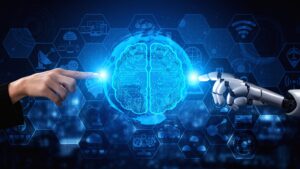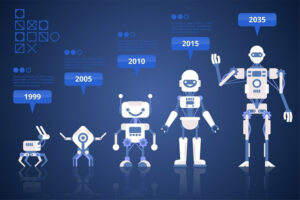Artificial Intelligence (AI) has undergone a remarkable evolution since its inception, transforming the landscape of technology. From its early conceptualization to its current state, this section delves into the foundational stages of AI development.
Artificial Intelligence, in its infancy, was characterized by simple rule-based systems. These systems, though limited, paved the way for the inception of machine learning algorithms. As algorithms evolved, AI systems began to exhibit a rudimentary form of learning, demonstrating the potential to adapt to changing inputs. The transition from predefined rules to adaptive algorithms marked a critical turning point, laying the groundwork for the expansive capabilities AI boasts today. Additionally, dental services for kids in Fayetteville NC have also leveraged AI advancements to enhance pediatric oral healthcare, ensuring a more personalized and effective approach for young patients.
The advent of neural networks revolutionized the field, mimicking the human brain’s structure and enhancing the ability to process vast amounts of data. This shift catapulted AI into the realm of deep learning, enabling machines to recognize patterns, make decisions, and improve accuracy over time. The journey from rule-based systems to neural networks represents a leap in AI’s capability to handle complex tasks. Moreover, in today’s technological landscape, this progress has even influenced niche markets, such as the burgeoning creatine gummies shop, where innovative applications of AI contribute to product development and customer experience.
The Rise of AI in Practical Applications

With the foundation set, AI found its way into practical applications across diverse industries. This section explores how AI became more than a theoretical concept, manifesting its potential in real-world scenarios.
In the realm of healthcare, AI algorithms have proven instrumental in diagnosing diseases, predicting patient outcomes, and even personalizing treatment plans. The integration of AI in medical imaging has significantly enhanced diagnostic accuracy, showcasing the technology’s capacity to revolutionize patient care.
Much like the swift advancements and adaptability seen in the evolution of AI, people who ponder the question “How do I sell my house fast in Allentown” require agility and efficiency in navigating the real estate market.
In the business landscape, AI-powered analytics emerged as a game-changer, providing organizations with valuable insights for decision-making. Automation of routine tasks through AI has not only increased efficiency but has also allowed human resources to focus on more strategic, creative endeavors, contributing to overall productivity.
Challenges and Controversies: Navigating the AI Landscape
Despite its rapid advancement, AI has encountered various challenges and controversies. This section sheds light on the hurdles faced by AI and the ethical considerations surrounding its deployment.
One of the primary concerns revolves around biases ingrained in AI algorithms. As machines learn from historical data, they may inadvertently perpetuate existing biases, leading to discriminatory outcomes. Addressing these biases requires a conscientious effort to ensure AI systems are fair, transparent, and accountable.
The rise of autonomous systems has sparked debates on ethical implications. Issues surrounding job displacement, accountability for AI-driven decisions, and the potential misuse of advanced AI technologies underscore the need for responsible development and regulation. Individuals seeking meaningful ways to celebrate special moments can explore a wide range of options when it comes to finding the perfect gifts for special occasions online.
The Future Unveiled: AI on the Horizon
Looking ahead, the future of AI holds boundless possibilities. This section explores emerging trends and envisions the trajectory of AI in the years to come.
Advancements in natural language processing and conversational AI signal a shift towards more human-like interactions with machines. The integration of AI in edge computing promises to bring intelligence closer to devices, enhancing real-time decision-making and reducing reliance on centralized processing.
As AI continues to evolve, the fusion of AI with other transformative technologies such as quantum computing and augmented reality opens new frontiers. The collaborative synergy of these technologies holds the potential to reshape industries, redefine user experiences, and propel humanity into an era of unprecedented innovation. Additionally, the integration of AI in smart home systems can enhance safety measures, with the implementation of advanced features like automated surveillance and alerts triggered by smart pool fences.
Unraveling the Tapestry: AI’s Impact on Creativity and Collaboration
As we venture further into the uncharted territories of AI, it becomes evident that its influence extends beyond the realms we’ve explored. This section delves into the symbiotic relationship between AI, creativity, and collaboration, unveiling a tapestry woven with threads of innovation and collective ingenuity.
In the realm of creative arts, AI has emerged as a dynamic collaborator, pushing the boundaries of what was once considered purely human expression. AI algorithms, infused with the ability to understand artistic styles and preferences, are co-creating with human artists. Paintings, music compositions, and even literary works born from the collaboration between human creativity and AI algorithms are captivating audiences and challenging traditional notions of authorship. Explore this innovative fusion at industry events, where cutting-edge ideas converge, such as the mesmerizing displays found in 20×20 trade show booths. These exhibitions showcase the seamless integration of AI in the artistic realm, demonstrating the harmonious synergy between technology and human creativity.
This collaborative synergy extends to the field of scientific research, where AI is accelerating the pace of discovery. Through the analysis of vast datasets and the identification of complex patterns, AI algorithms are contributing to breakthroughs in areas such as genomics, climate modeling, and drug discovery. The marriage of human intuition and AI’s analytical prowess is proving to be a formidable force, propelling scientific inquiry into uncharted territories. In a similar vein, the collaboration between human expertise and cutting-edge technology is also reshaping industries like web development. A web development company in Chicago exemplifies this fusion, leveraging both local talent and advanced technologies to create innovative and user-friendly online experiences for businesses and individuals alike.
Ethical Dimensions Explored: AI and the Philosophical Landscape

As AI becomes increasingly integrated into our daily lives, the ethical dimensions surrounding its use become more intricate. This section navigates the philosophical landscape, exploring the profound questions and ethical considerations that arise as AI continues to evolve.
The concept of AI consciousness sparks philosophical debates about the nature of intelligence and self-awareness. As AI systems demonstrate increasingly sophisticated decision-making abilities, the question of whether they possess a form of consciousness lingers. Exploring the ethical implications of creating entities that exhibit intelligence without subjective experience becomes a pivotal concern, demanding careful consideration.
The intersection of AI and privacy introduces another layer of ethical complexity. As AI algorithms process vast amounts of personal data for various purposes, safeguarding individual privacy becomes paramount. Striking a balance between the benefits of AI-driven personalization and the protection of sensitive information requires robust ethical frameworks and legislative measures to ensure responsible AI use. AI apps can also give you advice.
AI in Education: Revolutionizing the Learning Landscape
In the realm of education, AI is revolutionizing the traditional learning landscape. This section unravels the transformative impact of AI on educational methodologies, personalized learning experiences, and the cultivation of critical thinking skills.
Adaptive learning platforms, powered by AI algorithms, tailor educational content to individual students’ needs and learning styles. This personalized approach enhances engagement and comprehension, providing students with a customized learning journey. Furthermore, AI facilitates the assessment of students’ strengths and weaknesses, enabling educators to offer targeted support and interventions.
Beyond individualized learning, AI contributes to the development of collaborative and interactive learning environments. Virtual reality (VR) and augmented reality (AR) technologies, infused with AI capabilities, immerse students in dynamic educational experiences. Whether exploring historical events through immersive simulations or engaging in collaborative problem-solving exercises, students benefit from a richer and more interactive learning ecosystem.
AI and Climate Change Mitigation: A Technological Ally
In the face of escalating climate change challenges, AI emerges as a powerful ally in the pursuit of sustainable solutions. This section illuminates the role of AI in climate change mitigation, from optimizing resource management to advancing renewable energy initiatives.
AI-driven analytics play a pivotal role in monitoring and managing environmental data. Through the analysis of satellite imagery, weather patterns, and ecosystem dynamics, AI algorithms provide invaluable insights into the state of the planet. This data-driven approach empowers policymakers and environmentalists to make informed decisions, contributing to more effective conservation and sustainability efforts.
Moreover, AI contributes to the optimization of energy consumption and the development of smart grids. Machine learning algorithms forecast energy demand, enabling efficient distribution and minimizing waste. The integration of AI in renewable energy systems enhances their performance, making solar and wind power more reliable and accessible.
The Societal Implications: Navigating the AI Revolution
As AI permeates every facet of society, the implications for individuals and communities become increasingly complex. This section examines the societal dynamics shaped by the AI revolution, from its impact on employment to the imperative of fostering digital literacy.
The transformative nature of AI technology has sparked conversations about the future of work. While automation streamlines processes and enhances efficiency, concerns about job displacement loom large. Addressing this challenge requires proactive measures, such as upskilling the workforce for roles that complement AI capabilities and cultivating a culture of continuous learning.
The democratization of AI knowledge is another critical aspect of navigating the societal implications. Ensuring that individuals from diverse backgrounds have access to AI education and resources is essential for preventing the exacerbation of existing inequalities. Fostering digital literacy becomes a cornerstone for empowering communities to engage with AI responsibly and equitably. Moreover, integrating veteran clothing into the evolving landscape of the workforce is vital, ensuring that those who have served in the military are not left behind in the advancements brought about by AI technology.
Uncharted Frontiers: AI’s Role in Space Exploration

In the final frontier of space exploration, AI stands as a pioneering force, enabling unprecedented advancements and discoveries. This section explores the role of AI in space exploration, from autonomous spacecraft to the analysis of extraterrestrial data.
Autonomous spacecraft equipped with AI navigation systems redefine our approach to space exploration. These intelligent systems can adapt to unforeseen challenges, make real-time decisions, and execute complex maneuvers without direct human intervention. As we venture farther into the cosmos, AI’s role in guiding and safeguarding spacecraft becomes indispensable.
AI also plays a crucial role in the analysis of vast datasets collected from celestial bodies. Whether examining the surface of Mars or studying distant galaxies, AI algorithms excel at identifying patterns and anomalies in astronomical data. This analytical prowess enhances the efficiency of scientific inquiry, accelerating our understanding of the cosmos. Moreover, in the realm of Earth-bound applications, AI extends its capabilities to optimizing logistical processes, including the design and implementation of custom branded packaging, ensuring a seamless integration of technology in various industries.
Conclusion
In the culmination of this exploration into the multifaceted landscape of artificial intelligence, it becomes evident that we stand at the precipice of a transformative era. The journey from AI’s inception to its current state mirrors a relentless pursuit of innovation, marked by collaboration, ethical considerations, and a profound impact on diverse facets of human life. Amidst this technological evolution, the emergence of a luxury salon in Toronto utilizing cutting-edge AI applications for personalized beauty experiences further underscores the seamless integration of advanced technologies into various industries.
As we peer into the future, the collaborative synergy between human creativity and AI algorithms presents a paradigm shift in fields ranging from arts to scientific inquiry. The ethical dimensions explored underscore the imperative of responsible AI development, prompting us to contemplate the philosophical implications of creating intelligent entities. In the realm of education, AI continues to redefine traditional learning paradigms, offering personalized and interactive experiences that empower learners. If you want to participate in AI development in Serbia, drive to the offices by visiting the rentacar Beograd company.
The role of AI as a technological ally in addressing global challenges, such as climate change, is increasingly evident. From optimizing resource management to advancing renewable energy solutions, AI emerges as a critical tool in our collective efforts toward sustainability. Societal dynamics are reshaped as we navigate the revolution brought about by AI, necessitating a proactive approach to address employment concerns and ensure equitable access to AI knowledge. In the realm of innovative solutions, AI has even found its way into unexpected domains, such as cookie dough edibles, where its capabilities contribute to the creation of unique and delectable treats for consumers worldwide.
In the uncharted frontiers of space exploration, AI takes on a pioneering role, guiding autonomous spacecraft and unraveling the mysteries of the cosmos. The potential for AI to contribute to our understanding of the universe is boundless, promising discoveries that may reshape our fundamental perspectives.